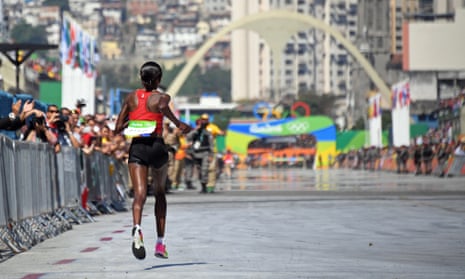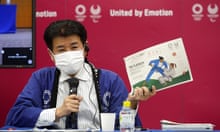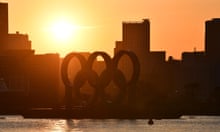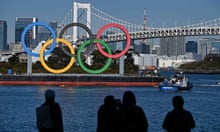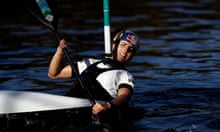The organisers of the 2020 Tokyo Olympics have been urged to start the marathon events at 5.30am to avoid the risk of deaths from the intense heat later in the day.
The call, from the Japan Medical Association (JMA) and Tokyo Medical Association (TMA), will reignite the debate over the wisdom of holding the Games in the middle of Japan’s hot and humid summer.
The International Olympic Committee and the Games’ organisers have already shifted the starting time for the men’s and women’s marathons from 7.30am to 7am, but experts said the change would do little to protect runners from heatstroke.
“We are seriously concerned about it,” the senior JMA official Kimiyuki Nagashima said this week, according to the AFP-Jiji news agency.
Nagashima said athletes, officials, volunteers and spectators were all at risk, and that a spike in demand for emergency medical treatment would put a serious strain on local hospitals and ambulance services.
The associations said they had called on organisers to start the marathon events at 5.30am to ensure athletes ran most of the race when heat levels were less hazardous to their health.
“We wouldn’t have visited the organising committee if we’d thought it was only slightly worrying. We fear the current plan could lead to deaths,” said Haruo Ozaki, the president of the TMA.
Using wet-bulb globe temperature – an index used to estimate the effects on humans of temperature, humidity and other factors – a team led by Prof Takaaki Matsumoto at Chukyo University said temperatures in Tokyo would be at a “severe warning” level of 28-31C at most stages of a marathon starting at 7am, but would drop to a “warning” level of 25-28C if the event started at 5.30am.
In April, the Scottish runner Callum Hawkins collapsed from heat exhaustion in 30C heat 2 miles from the finish of the marathon in the Gold Coast Commonwealth Games. Organisers were criticised for not providing adequate medical assistance to Hawkins, who was not attended to by paramedics for several minutes.
Japan’s ruling party recently rejected calls to introduce daylight saving time, saying it would be logistically impossible to implement the measure in time for the Games, which begin on 24 July.
In July this year a record 133 people died from heatstroke or heat exhaustion in Japan, with thousands of others admitted to hospital.
Japan experienced its highest temperature on record on 23 July, when the mercury reached 41.1C in Kumagaya, a city north-west of Tokyo. Several other cities recorded temperatures of around 40C.
Tokyo’s governor, Yuriko Koike, likened Tokyo to “living in a sauna” and voiced concern about the impact similarly high temperatures could have on athletes and spectators. “Taking countermeasures against the heat is one of the major pillars for the success of the 2020 Olympics,” she said.
The last summer Olympics in Tokyo, in 1964, were held in October.
